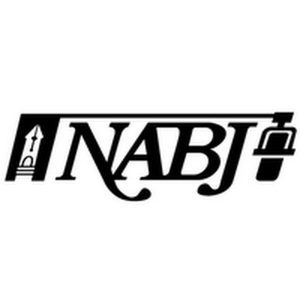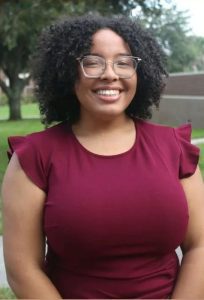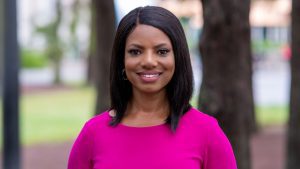
Miranda Camp, National Association of Black Journalists (NABJ) President at UCF
- Can you please introduce yourself?
- “My name is Miranda Camp, I am the NABJ President of the 2022-2023 year and I am a journalism major.”
- As a member of NABJ, please tell me about your experiences. What is your favorite part about being a journalist?
- “NABJ is really a fantastic group that offers a lot of opportunities to students. I found it actually when I started school during the pandemic. I was a 2020 graduate, so I really didn’t have a lot of connection in my first few journalism courses. So, I sought out NABJ because I was looking for a place to find my community. NABJ has served me in a lot of different ways. I met my mentor Tania Sims through NABJ, I’ve learned about other people that look like me in my program and I’ve been able to make friendships through it and I believe that’s a beautiful thing. We also have a sister chapter, which is the Central Florida chapter which is fantastic for networking and getting those steps you need to take in order to become a full-fledged journalist.”
- What are some things you found challenging?
- “Some things that I found challenging about media in general (and the journalism world in general) is that when you don’t have the representation that you need, your voice gets washed out. I’ve heard of a lot of instances. NABJ has a segment called “Uncomfortable Conversations with a Black Journalist,” so in our media market we have a Black journalist that comes on and talks about some of their challenges. I’ve heard time and time again that I pitch something or suggest a story that goes on in our community and it won’t be seen in the same importance as our White counterparts or White counter story which I think is very upsetting and is the reason that we have certain organizations that are creating space for those stories. It’s really hard for me personally and emotionally to not feel that nobody cares about these stories because they have a Black narrative instead of a White narrative which is really hard to come to terms with and having to become a space for those stories. It’s hard being the constant advocate. It’s annoying because even on a small scale, on a UCF scale, a lot of people don’t see the point of NABJ and why we have to have a group for black journalists. It’s kind of disheartening because so many times, more often than not, I see stories that are misinterpreted or misreported because people don’t have those lived experiences that Black people have. So, I feel like these types of groups are important and we need them in order to make sure that people are giving accurate and compelling stories about their own races.”
- What are some things you’ve accomplished with NABJ and would like to see in the future?
- “Some of the things that we accomplished with the NABJ is creating opportunities for students to get the chance to network with Black media representatives and individuals. It’s really cool to see students interact with them. I know when I first met some of these prominent Black journalists in our area, it felt very intimidating but then I got to hear them talk and speak about their lived experiences in the market. And I’m like, well, maybe I can do this. Maybe it’s not completely out of my reach and it humanizes the whole aspect of it which is really cool. And something else we get to do is create our own space which is really comfortable. There are certain nuances that you’re not going to be able to fully express in a classroom setting especially as a Black individual. Even if it’s unintentional, sometimes professors say things that make you feel uncomfortable or you don’t know how to address it. And having a space where you can talk to an upperclassman and be like, “hey, this professor said something kind of weird and I don’t know how I feel about it” or “we were talking about this certain topic in class, and I feel as though it’s been misconstrued.” I feel like making that space is really important, so I’m glad I’m a part of that. I’ve had members come up to me telling me they have imposter syndrome or feel like this program isn’t meant for them, and being able to be tell them, “It’s okay, everyone feels like that at some point.” Have that sense of family and community is really important and I love the fact that NABJ was that for me and now I get to provide that.”
- What does Black History Month mean to you?
- “I think that making sure Black voices are the forefront of Black stories is really important and making sure that you’re having the people that look like the people we’re telling stories about is important. Communities don’t feel comfortable with coverage that doesn’t come from them. So, making sure that we continue to do that, pursue that diversity in the newsroom, pursue it in the media market is not only going to help journalism restore its validity in some peoples’ eyes but also make sure that people are in the know about what they need to know about. That’s the whole point of this, the whole point of journalism and creating those spaces. Me personally, I think that oftentimes Black people aren’t being heard even when we are seen, even if you are seeing our trends and things that we have created, you are not seeing us. Know where your influences in your life are coming from. If there’s something in your life that you know is created by Black people or experienced by Black people, be aware of that and make sure that you create those spaces for Black people when you can and give back to those Black people that created it when you can. I think that’s important, and I would put that for anybody, not just Black people, any culture should be given thanks to when you can, especially if it’s something you benefit from.”
- What is your biggest inspiration?
- “My biggest inspiration is seeing the Black women in my media market like Tammie Fields and Vanessa Echols command the spaces that they’re in is really fantastic. But I also draw inspiration from a lot of different things personally. I think that those women have been guiding lights and it’s fantastic to not only see them trailblazing for younger journalists like me and also giving back when they can. They’re making these spaces for us while also simultaneously supporting us which I find incredibly inspiring.”
- “Another inspiration of mine is the former NABJ President, Tania Sims. Seeing on a smaller scale the spaces that she created here at UCF made me realize that not only am I not alone in this program, but I also don’t have to feel alone in this program, and there are people out there that have gone through similar experiences to me that are making these spaces for us. It really opened my eyes.”

Miranda Camp, President of NABJ

Tammie Fields
Photo Courtesy of Spectrum News 13.
Tammie Fields, News Anchor
- What is your favorite part about being a news anchor?
- “Being able to be part of the editorial process and stories that I know are important to our communities and bringing those stories to meetings with my managers and seeing at the end of the night are on air. That is my all-time favorite part of the job.”
- What are some things that you found challenging?
- “It is very time-consuming job. There is a lot to do. I would say, it is not just your job when you show up for the day. As a journalist, you are on the clock 24 hours a day. So, at the grocery story you overhear a conversation or in th community you hear somebody talking about something. Most of us don’t just go “oh wow, that’s so interesting,” most of us say, “hey, sorry to interrupt, but what is the deal? What happened? Would you be willing to talk to us on camera?” So, a lot of the stories that we get are from the community or just from having the sense to see something that’s going on nationally and see how it’s going to be impacting our community. You’re a journalist 24 hours a day, it’s not really an 8-hour job.”
- What does Black History Month mean to you?
- “It is a special month, specifically for me because I am at the age where I remember that there were not a lot of people of color when I would turn on the evening news or watch the news with my grandmother or my own parents. Black History Month is a time to look at the accomplishments and achievements of people of color and see how many of those doors have opened. So many people of all different backgrounds and races who may not get the accolades, but they played the part and moved mountains to allow people opportunities that for decades didn’t have the opportunities even though they could do the job and really excel at it; they just didn’t get the opportunity to do it because of the color of their skin.”
- Do you have any advice or words of wisdom for POC young aspiring journalists and news anchors?
- “I would say to be persistent and if you want to be a journalist, don’t take no for an answer. Do everything that you can to hone your skills. It’s important that you know what the mission of being a journalist is; it is not to master dances on TikTok videos or show off your shoes or dress on a Tweet. It’s to give to those who don’t have any voice a voice so that we know what’s going on in our communities and around us.”
- Can you tell me a bit about your experience with NABJ?
- “I am a long-time member of the NABJ and what I love about them is that they have people from different backgrounds and all different types of media whether it be print or radio or podcast, network news, local TV news, entertainment and sports and everything in between. What they do is they’re advocates for journalists of color and want to make sure that we master our skills, and so they have regional and national events each year where we come together and we get to go to these sessions where you have access and you’re literally talking to network anchors that when you turn on the news you’ll see tonight at 6:30. They’re having lunch and breakfast with us, they’re in the hallways, having sessions, and talking with them just like I’m talking to you but in person. So, it is an organization that is near and dear to my heart even as a young journalist when I had no resources, an entry level journalist with no resources that can barely get to the convention and go to events they had. The journalists just embraced me; it’s like a family reunion. Last year, when we came together it was called Unity and every few years it is an association event with the National Association of Hispanic Journalists (NAHJ) and NABJ because we want our communities to be able to work together, know the challenges that we face and be able to help each other out. It’s not just for folks of color; it’s for everybody to make sure that we are serving our communities and learning from each other.”
- What is your biggest inspiration?
- “My biggest inspiration is my mother, Betty Fields, because she came from a tiny town that you would probably just drive right through and lives down a dirt road in a wood frame house where you would look down and see between the wood boards. She just had a dream of leaving that little, small town in Arkansas and going to college. With very little money in her pocket, she didn’t have a car, but she was extremely smart. She tested out of a lot of classes and was able to go to college and it changed her life and the lives of her brothers and sisters. It changed my life because I learned the work ethics of working hard and you are as educated as you possibly can be.”
- What can students, journalists and people in general do to continue to uplift and empower Black voices?
- “I would say just be open and be curious. It’s hard to do the things you are talking about if you don’t know or work with, worship with and eat with people who look different than you. So, I would impress upon everybody to do those things because that’s the only way to continue during Black History Month to highlight the achievements and accomplishments of people of color. Also, by learning through the people that are here now; the challenges they face and triumphs they have as well.”
By Majdulina Hamed.
Published to Nicholson News on February 2nd, 2023.
If you have any news, accomplishments or highlights about your work or life, please be sure to share them with us, by emailing us at NicholsonNews@ucf.edu.